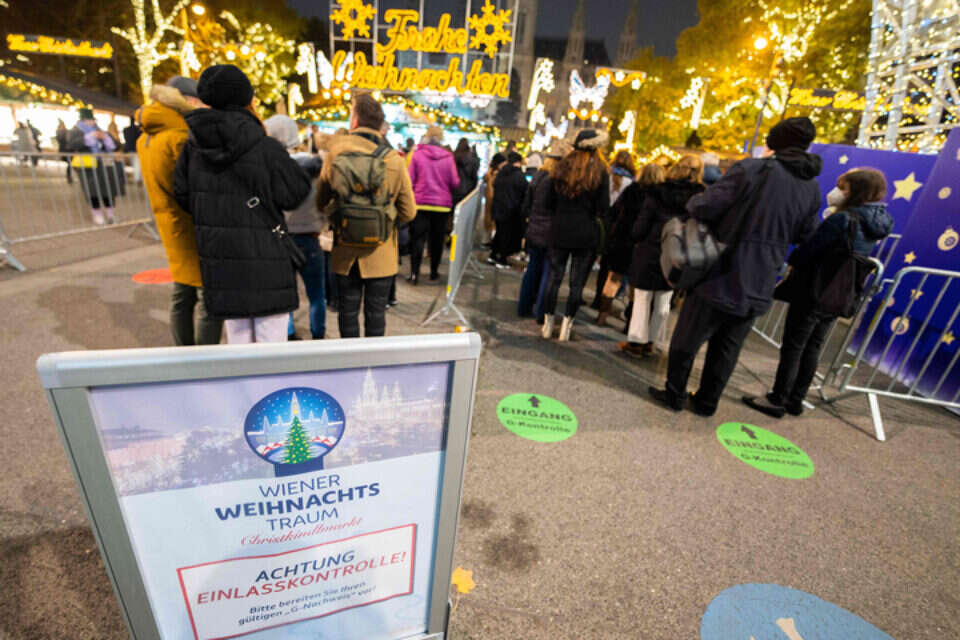Trust the health authorities: Vaccination of children in Denmark
Against the backdrop of rising morbidity and the discovery of the new variant Omicron, Denmark is re-labeling the corona virus as a "critical threat to society", just two months after declaring the virus a "non-critical threat to society".
The government has reinstated the restrictions, including the green passport.
The decision comes after the number of daily verified stands at about 3,000, almost at the same levels as in December last year, before the launch of the vaccination campaign.
The green passport, which was revoked this summer, now applies to restaurants, nightclubs, cafes, hospitals, concerts, theaters and more.
The government is also considering legislation that would allow employers to require a green passport from their employees.
Denmark is now one of the most vaccinated countries in Europe, with about 75% of all Danes receiving two servings, and about 7% receiving the booster, mostly the elderly.
In December, the Ministry of Health is expected to advise all adults to take the booster.
While some European countries are struggling to persuade people to get vaccinated, support among Danes is extremely high.
India: 17 million people infected in Corona // Photo: Reuters
A recent study in the country revealed that more than 90% of Danes trust the national health authorities to deal with the epidemic, while almost 80% support the government's anti-corona policy. When the Danish prime minister, Mada Fredricksen, called on people to get vaccinated, thousands signed up overnight. In other words, the Danes trust the government’s recommendations and support the restrictions, so there was almost no need to impose severe closures and an obligation to isolate or distribute fines. The lead professor of this study, Michael Bang Petersen, believes public confidence will remain. "In fact, it seems that people want the government to impose restrictions now. The latest survey shows that 91% support the green passport," Prof. Petersen told Israel Today.
In contrast, the medical staff are dissatisfied with the government.
While the health care system has overcome the challenge, the nurses in particular are not happy with their working conditions.
This led to a strike of 5,000 nurses, which lasted ten weeks.
However, they did not receive any of the demands, and the anger only intensified with Prime Minister Fredriksen's request that they make a further effort against the background of the rise in morbidity.
Citizens await in Denmark vaccination center // Photo: AFP,
Winter is coming, but with a high immunization rate and public support for restrictions, Denmark may emerge from the new wave of the virus.
Yotam Confino is a journalist on the Danish network TV2
Closed Christmas markets: closed in Vienna
In Austria it is not yet digested that there is another closure - or at least repressive. Suffice it to look at what's going on in one of the malls in the center of the capital Vienna: near a supermarket of a large chain people come to buy groceries knowing that this is the chain that is also open on Sundays. But one after the other they are surprised to find that the network has changed its operating hours, and they are forced to return as they came. Indeed on the sign on the door they deleted and changed the activity days accordingly. A passerby who also arrived and was disappointed told me he did not know about it. He added that even on weekdays the activity of the branch was reduced. In fact the branch was open until 23:00 at night, and now only until 18:00 in the evening. In a nearby building, at a fast food Mexican store, I asked if there was an open supermarket in the area. The employee was apparently not updated on what was happening at the nearby mall, and Yashar referred me to the closed supermarket.
The closure has led to the closure of everything not needed in the country, but restaurants and cafes are open for deliveries.
The writers are also open, but as mentioned - they changed the hours of operation.
In the entertainment area Stephensplatz the Christmas atmosphere is still felt, and a fir tree next to a huge menorah is placed next to the cathedral.
But the crowds that come to the area come to hear the organ in the cathedral or to have a beer standing by the pubs that serve them alcohol in disposable glasses.
Protest of vaccine opponents in Vienna, Austria, Photo: AFP
Although masks are worn everywhere - and it is mandatory to use only the N95 or a similar model, no store asks for permission to be vaccinated, because it is forbidden to stay there anyway - not even by public transport.
Surprisingly, even supermarkets do not ask for the presentation of a vaccination certificate despite the law requiring them to do so, probably out of fatigue and burnout.
On top of that, even keeping a distance between people is no longer strict.
The various government testing and vaccination complexes in the city are deployed in containers where everyone can access and be tested at no cost, including the glorious Vienna Convention Center which is bustling with life precisely because of the corona - all come to be tested.
Either way there are many casualties from the quarantine.
It is enough to have a regular conversation with a taxi driver who explains that there is no work because you do not need taxis like before.
The closure is back but in Austria, it seems, they are denying it and are mainly eyeing the big prize: Christmas.
The country hopes that by then rage will pass, and in the meantime living a closed routine.
Israel Today courier to Vienna, Erez Lin
Very vulnerable to another wave: The population in India is in no hurry to get vaccinated
According to government data, only 380 million people received the two doses of the vaccine, and another 375 million received the first dose. If that was not enough, more than 100 million people did not show up for the appointment, leaving the country vulnerable to another wave. To cover all adults in India will need at least 188 million doses, and at the current immunization rate, of about four million doses daily, India will be able to reach its target by May-June 2022. Health experts believe the lack of vaccine information, especially in rural areas, is hurting efforts to achieve rates Higher immunization.
The rate of infection in India continues to slow.
The number of new daily cases has dropped from a peak of 400,000 in May 2021, and now stands at about 10,000 cases.
In India, serological surveys have also been conducted routinely since the onset of the plague.
The fourth National Serological Survey, conducted in July, found that 67.6% of people in India have antibodies to the virus.
At the time of the survey, about 25% were vaccinated with only one dose and only 13% with two, meaning that a significant portion of the population had antibodies because they became infected with the virus and recovered.
Students in India.
The population is exposed to another wave of illness, Photo: AFP
Although some experts believe that another wave could be prevented, for others the current period is reminiscent of February-March 2021, when the daily number of cases dropped to 12,000 and people returned to the crowd, but soon after another wave appeared, and the daily infection cases reached 400,000 .
The real number seemed to be much higher, as most of those infected apparently could not reach a checkpoint at all, and went directly to the hospital.
In recent months, life in India has been moving back in the direction of normalcy.
The markets are full of visitors, and tourists can be seen re-entering the country.
India has also celebrated its big holiday season, and the wedding season is about to open.
In addition, five states are expected to hold elections to their legislatures early next year, including the most populous state, Uttar Pradesh, where only one in five graduates is fully vaccinated.
But in light of the revelation of the omicron, there is concern that it is a quiet pre-storm and even if the blow of the delta is behind us, things could deteriorate rapidly.
Ankita Tripathi
Were we wrong?
Fixed!
If you found an error in the article, we'll be happy for you to share it with us















